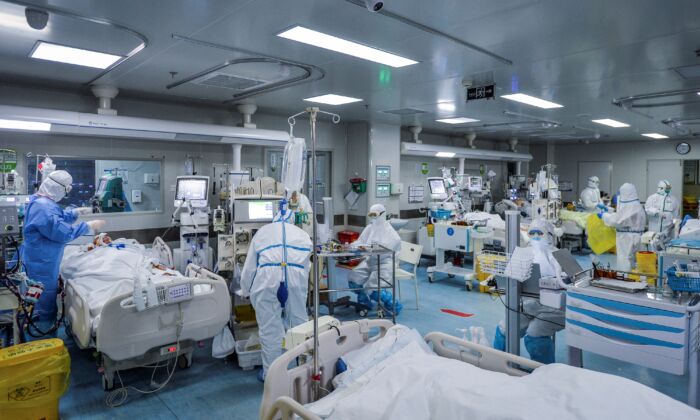House of Representatives Overwhelmingly Passes Antilynching Act
“There are so many deaths. The mortality rate of patients in critical condition is about 80 percent, and the mortality rate of patients in severe condition is 20 percent,” said doctor Chen, who is treating the ill in one of the cities hard-hit by the novel coronavirus (COVID-19) outbreak in China.
In an exclusive interview with The Epoch Times on Feb. 27, Chen discussed what he saw and experienced in the city of Ezhou, about 50 miles east of Wuhan, where the outbreak first emerged. Both cities are within Hubei province.
Chen is a young doctor dispatched from another province to Ezhou to help treat the large numbers of COVID-19 patients there.
As a doctor with a lot of experience treating patients with respiratory diseases in intensive care units (ICU) and respiratory care units (RCU), he was assigned to the Ezhou Central Hospital in February to treat COVID-19 patients.
Chinese authorities have forbidden medical staff from accepting media interviews. To protect Chen, The Epoch Times has decided to withhold Chen’s full name and hometown.
Situation in Ezhou
Chen received a sudden notice from his workplace in early February.
“We departed to Hubei in three-and-half hours,” Chen said.
He was aware of the risks of being at the frontlines. “I’m afraid of becoming infected, and even dying. After I received the order, the first thing I did was take a photo with my family members. I was worried that I would not be able to come home.”
Ezhou is a city has about 1.03 million people. On Jan. 23, Ezhou and Wuhan authorities announced a lockdown, banning all public transportation and traffic on the roads in order to prevent people from potentially spreading the virus further.
Chen said about 700 to 800 medical staff have arrived in Ezhou from other provinces to help treat virus patients, bringing the total number of medical staff in the city to roughly 3,500.
But it’s still not enough. “We need more [medical staff]. There are so many patients,” he said.
The Ezhou Central Hospital where Chen is working only treats patients in severe and critical condition.
He said that there are currently more than 300 patients hospitalized, with over 40 in critical condition.
Chen heard from hospital leaders and local doctors that currently there’s another 700 to 800 coronavirus patients in mild and moderate condition who are receiving treatment at other hospitals in Ezhou.
The city government has also approved and begun construction on a new hospital to deal with the current outbreak, called the Ezhou Leishan Hospital. It will supply 772 beds in total when completed. One section of the facility is already built and has the capacity for over 200 beds.
Chen said this hospital will be for treating patients in moderate and mild condition.
Ezhou also needs more medical supplies, including protective suits, masks, goggles, and disinfectants, Chen added.
“Ezhou relied on Wuhan for medical supplies. After Wuhan was on lockdown from Jan. 23, Ezhou had to secure supplies by itself. So, it’s obvious that we need all kinds of resources,” Chen said.
 A nurse is operating an equipment in an intensive care unit treating COVID-19 coronavirus patients at a hospital in Wuhan, China, on Feb. 22, 2020. (STR/AFP via Getty Images)
A nurse is operating an equipment in an intensive care unit treating COVID-19 coronavirus patients at a hospital in Wuhan, China, on Feb. 22, 2020. (STR/AFP via Getty Images)Tough Conditions
Furthermore, about 70 staff at Chen’s hospital have already contracted the virus after coming into contact with patients.
“At the beginning of the outbreak, a large number of patients were crowded at the hospital. Local medical staff didn’t have enough protective suits, so it was as if everybody was exposed to a virus ocean,” Chen said.
He heard that thousands more staff have become infected within Wuhan. Others are suspected cases, or their CT scan results exhibit fluid in the lungs—a symptom of COVID-19—but whose diagnostic kits come back negative.
Some have already died.
Chen said the medical staff can protect themselves better now, but the workload was extremely heavy.
“The protective suits are airtight, and we’re sweating inside while wearing them,” Chen said. “Also, we can’t eat, drink, or go to the bathroom during our work shift.”
Chen explained that staff cannot take off their protective suits before their shift, as they can only be worn one time. Due to lack of supplies, each person can only have one suit per day. To avoid the need to go to the toilet, they choose to eat and drink very little before going to work.
“Basically, even a strong person will be exhausted after a six-hour shift,” Chen said.
He noted the situation was worse before he and his colleagues were dispatched to Ezhou. “They [local medical staff] needed to work 12 hours per day during the beginning [of the outbreak],” Chen said.
But the most difficult thing to endure was seeing the patients suffer.
“Seeing the patients die one by one, but we don’t have an effective treatment… After we finish our workday, we feel very sad,” Chen said.
This article is from the Internet:‘Seeing Patients Die One by One’: Doctor in Coronavirus-Stricken City in China Recounts Harrowing Experience
Feds Order California Reservoir Drained Over Earthquake Concerns
